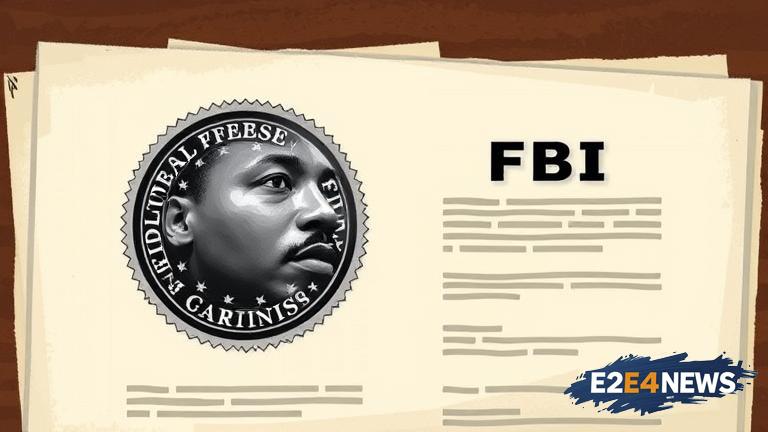The Trump administration has released a trove of previously classified FBI records on Martin Luther King Jr., providing new insights into the bureau’s surveillance of the civil rights leader. The records, which include memos, letters, and other documents, were released despite objections from the National Archives and Records Administration. The release of the records has sparked controversy among historians and civil rights activists, who argue that the documents could damage King’s legacy and reveal sensitive information about his personal life. The FBI’s surveillance of King was a major aspect of the bureau’s efforts to monitor and disrupt the civil rights movement, and the released records provide new details about the extent of this surveillance. The records show that the FBI monitored King’s phone calls, tracked his movements, and gathered intelligence on his associates and allies. The bureau also attempted to discredit King and undermine his leadership of the civil rights movement. The release of the records has been criticized by many, who argue that the documents could be used to smear King’s reputation and undermine his legacy. Others have argued that the release of the records is a necessary step towards transparency and accountability, and that the documents provide important historical context for understanding the civil rights movement. The National Archives and Records Administration had previously determined that the records should remain classified until 2027, citing concerns about the potential harm that the documents could cause to King’s legacy. However, the Trump administration overruled this decision and released the records, citing the need for transparency and accountability. The release of the records has sparked a heated debate among historians and civil rights activists, with some arguing that the documents provide important new insights into the civil rights movement, while others argue that the release of the records is a misguided attempt to undermine King’s legacy. The controversy surrounding the release of the records has also raised questions about the role of the FBI in monitoring and disrupting the civil rights movement, and the extent to which the bureau’s actions were motivated by a desire to undermine King and other civil rights leaders. The release of the records has also sparked concerns about the potential impact on King’s family and legacy, and the need for careful consideration and sensitivity when releasing sensitive historical documents. Overall, the release of the FBI records on Martin Luther King Jr. has sparked a major controversy and debate, with important implications for our understanding of the civil rights movement and the legacy of one of its most important leaders. The release of the records has also raised important questions about the role of government agencies in monitoring and disrupting social movements, and the need for transparency and accountability in these efforts. As the debate over the release of the records continues, it is clear that the legacy of Martin Luther King Jr. remains an important and contested aspect of American history and culture. The release of the records has also sparked a renewed interest in the life and legacy of King, and the ongoing struggle for civil rights and social justice in the United States. The controversy surrounding the release of the records has also highlighted the need for careful consideration and sensitivity when releasing sensitive historical documents, and the importance of prioritizing transparency and accountability in these efforts.
